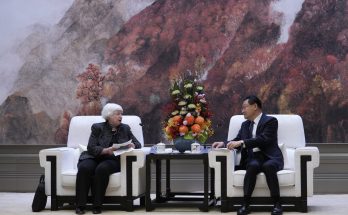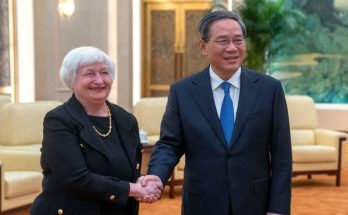
Unfazed by an escalating trade war and souring relations with the US China is determined to thwart “trade bullyism practices” and has pumped in $109 billion to revive economic growth.
In response to US President Donald Trump’s sharp spike in tariffs on Chinese goods worth $200 billion, China has launched a multi-pronged plan to protect the $12 trillion Chinese economy from a bitter trade war with its largest economic partner.
On October 7, China’s central bank announced a sharp cut in the level of cash that banks must hold as reserves, which will inject 750 billion yuan (around US$109.2 billion) in cash into the banking system by releasing 1.2 trillion yuan in liquidity.
The move came amid unrelenting US-China trade war, with Beijing making it clear that it will fight it out till the end and emerge unscathed.
China to US: Don’t underestimate our will

Invoking the resilience of the Chinese culture, China stressed that it will not cave in to US demands even if it faces further tariffs on its exports, said China’s Commerce Minister Zhong Shan. “There is a view in the US that so long as the US keeps increasing tariffs, China will back down. They don’t know the history and culture of China,” Mr Zhong said. “This unyielding nation suffered foreign bullying for many times in history, but never succumbed to it even in the most difficult conditions. China doesn’t want a trade war, but would rise up to it should it break out.
“The US should not underestimate China’s resolve and will.”

In a meeting with US Secretary of State Mike Pompeo in Beijing on October 8, Chinese Foreign Minister Wang Yi told his American counterpart that the United States should immediately stop its “wrong remarks and actions,” including the trade war. In response, Mr Pompeo said that the United States has “great concerns about actions that China has taken.
“Fact-check: China’s White Paper
“China does not want a trade war, but it is not afraid of one and will fight one if necessary,” China said in 171-page White Paper, published on September 25, which provides point-by-point rebuttal to accusations hurled by the US, which range from unfair trade practices and rampant IPR violations and intellectual theft by Chinese companies.
In the White paper, China has accused the US of “trade bullyism practices” that have become “the greatest source of uncertainty and risk for the recovery of the global economy.” The document was published on the same day the world’s largest economies hit at each other with tariff hike: The US imposed tariffs on an additional $200 billion of Chinese goods, while China retaliated by targeting roughly $60 billion worth of U.S. imports.
To counter the US’ “propaganda offensive,” China has also positioned itself as the protector of an open and free economy, a message that Chinese President Xi Jinping projected at the World Economic Forum in Davos and reinforced it at the Boa Forum and other multilateral platforms.
“We have a highly resilient economy, an enormous market, and the hard-working, talented and united Chinese people. We also have the support of all countries in the world that reject protectionism, unilateralism and hegemony.”
“The US government has taken extreme trade protectionist measures, which have undermined the international economic order, caused damage to China-US trade and trade relations around the world, disrupted the global value chain and the international division of labor, upset market expectations, and led to violent swings in the international financial and commodity markets. It has become the greatest source of uncertainty and risk for the recovery of the global economy,” the paper said.
Beijing has also launched a fact-correction exercise and accused Washington of practices that stifle fair competition in the US like subsidies and invoking national security laws to obstruct the “normal investment activities” of Chinese companies in America.
China has also kept the door open for negotiations with the US, but has made it clear that it’s difficult to hold negotiations with the US putting a “knife to China’s neck,” China’s Vice Commerce Minister Wang Shouwen said.
“A solution can only be reached if both sides are on equal footing and show sincerity,” Mr Wang added. He underlined that the white paper’s content called for “mutual respect” and “win-win cooperation” between China and the US.
“China has kept the door to negotiations open, but negotiations can only happen when there is mutual respect, equality good faith and credibility. Negotiations cannot be conducted under the threat of tariffs, or at the cost of China’s right to development,” the white paper said.
US-China two-way investment supported 2.6 million jobs in America. Specifically, Chinese investment covered 46 states of the US, generating for the US more than 140,000 jobs, most of which are in manufacturing, said the White Paper.
“Trade and economic cooperation have brought real benefits to American consumers. Bilateral trade provides consumers with a broad range of choices, lowers their living costs, and raises the real purchasing power of the American people, especially the low- and middle-income cohort. According to the US-China Business Council, in 2015, trade with China saved every American family US$850 of expenditure each year, which is equivalent to 1.5% of the average household income in the US.”
Amid a bitter trade spat between the world’s largest economies, the International Monetary Fund has warned that a trade war between the US and China risks making the world a “poorer and more dangerous place.”
In its outlook for the global economy, the IMF has said that a full-blown trade war between the US and China would adversely impact global economic recovery.
Author Profile
Latest entries
 India and the WorldAugust 25, 2019Amid Pakistan’s Kashmir fury, UAE, Bahrain fete Modi with top civilian honours
India and the WorldAugust 25, 2019Amid Pakistan’s Kashmir fury, UAE, Bahrain fete Modi with top civilian honours India and the WorldAugust 15, 2019India@72: Modi unveils Rs100-trillion infrastructure upgrade for $5 trillion economy
India and the WorldAugust 15, 2019India@72: Modi unveils Rs100-trillion infrastructure upgrade for $5 trillion economy India and the WorldJuly 22, 2019Chandrayaan-2 launch: India’s Moon dreams soar high
India and the WorldJuly 22, 2019Chandrayaan-2 launch: India’s Moon dreams soar high India and the WorldFebruary 20, 2019Saudi Arabia bets on $100 billion India opportunity, backs terror concerns
India and the WorldFebruary 20, 2019Saudi Arabia bets on $100 billion India opportunity, backs terror concerns






